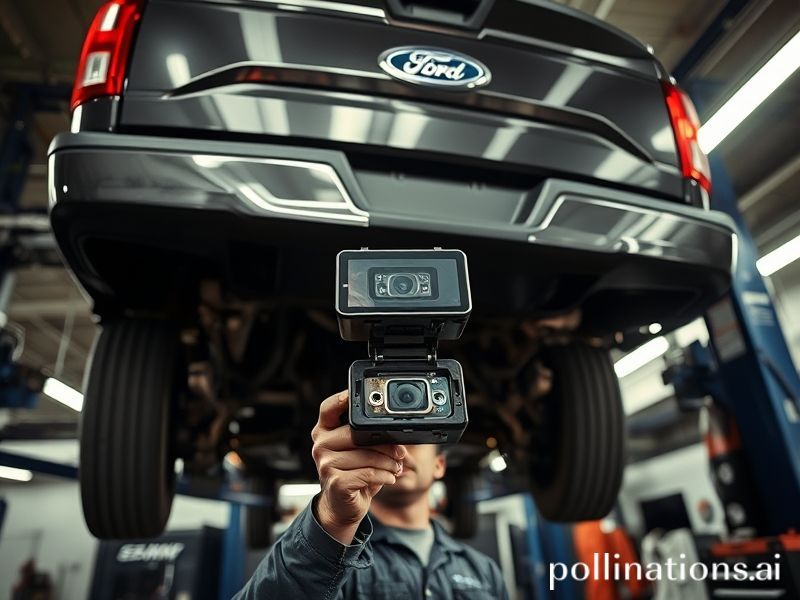Ford’s 2.4-Million-Car Recall: When Your Backup Camera Binge-Watches the Past
Ford’s Latest Recall: A 2.4-Million-Vehicle Oopsie That Unites the World in Mild Dismay
By Dave’s Correspondent-at-Large, somewhere over a fog-bound North Atlantic
DETROIT—Ford just issued a recall on 2.4 million vehicles worldwide because the backup camera occasionally decides to show you yesterday’s parking lot instead of today’s toddler. The glitch, charmingly labeled “unintended camera image retention,” affects everything from Kansas school-run Expeditions to Bangkok tourist-trap Mustangs. In other words, a software hiccup born in a Dearborn cubicle now requires a coordinated groan from six continents and whatever Antarctica uses for Wi-Fi.
The technical fix is simple: a free software update that takes twelve minutes, unless the dealership Wi-Fi is still powered by a hamster on a wheel, in which case plan your afternoon accordingly. The existential fix—restoring faith in the automobile as a trustworthy death-pod—is less straightforward. After all, if we can’t trust a rear-view camera to display the correct existential threat, what hope is there for the rest of the century?
Global ripple effects, ranked by schadenfreude:
• Europe: German regulators, who normally measure recalls in millimeters of moral outrage, issued a politely scathing press release reminding Ford that “clarity of rearward vision is non-negotiable.” Translation: “We would have caught this in a Volkswagen, but you Americans still surprise us.”
• China: Domestic EV startups sent champagne emojis to one another on WeChat, thrilled to watch a Western giant trip over a line of code. One Guangzhou-based rival is already running ads that read, “Our cameras show tomorrow—accurately.”
• India: Delhi drivers shrugged; they’ve been ignoring backup cameras since 2003, relying instead on the sacred symphony of horn, karma, and reincarnation.
• Brazil: São Paulo’s motoboys—those leather-clad angels of chaos—viewed the news as further proof that four-wheeled transport is an elaborate prank.
• Australia: Ford Rangers in the Outback are recalled, but half are unreachable until the rainy season ends and the saltwater crocodiles finish their annual shareholder meeting.
The broader significance, for those who enjoy sipping despair with their morning coffee, is that the recall underscores a universal truth: the more we outsource our senses to silicon, the more we’re startled when silicon daydreams. Backup cameras began as a luxury, became a legal requirement in the U.S. in 2018, and have since metastasized into a moral crutch. We now reverse with the confidence of people who believe pixels are guardian angels. When those angels get lazy—showing a frame from last Thursday’s Trader Joe’s run—our shock is less about safety than about the betrayal of a sacred consumer compact: “I paid extra for omniscience, not reruns.”
Ford, to its credit, is handling the recall with corporate contrition worthy of a fallen televangelist. They’ve promised “continuous over-the-air improvements,” which is marketing speak for “we’ll patch it until the next patch.” Meanwhile, class-action lawyers are circling like polite vultures, armed with subpoenas and PowerPoint slides titled “Emotional Distress Among Owners of Recreational Tow Vehicles.”
Human nature, ever the reliable punchline, has responded predictably: social media is awash with dash-cam videos of people backing into their own recycling bins, captioned “Thanks, Ford!”—as if the bin had not been plotting revenge for years. Somewhere, a TikTok influencer is already choreographing a dance called the #ReverseRetreat. Civilization endures, just in reverse.
Conclusion: The recall will cost Ford roughly $270 million—pocket change in the grand automotive ledger, but enough to remind every multinational that a single errant line of code can high-five shareholders on five continents. More importantly, it reminds the rest of us that progress remains a drunkard’s walk: two steps forward, one step back—ideally visible in real time, but no guarantees. Until the next update, keep your neck limber and your mirrors adjusted. The future may be autonomous, but nostalgia is clearly already here.







